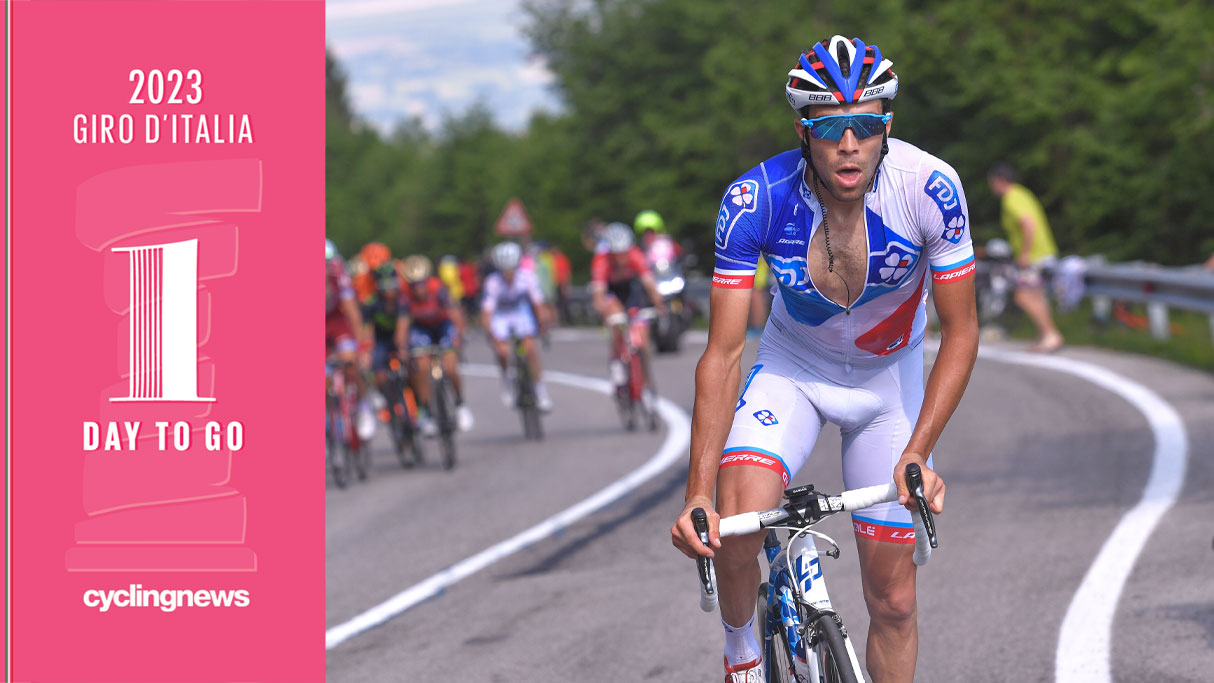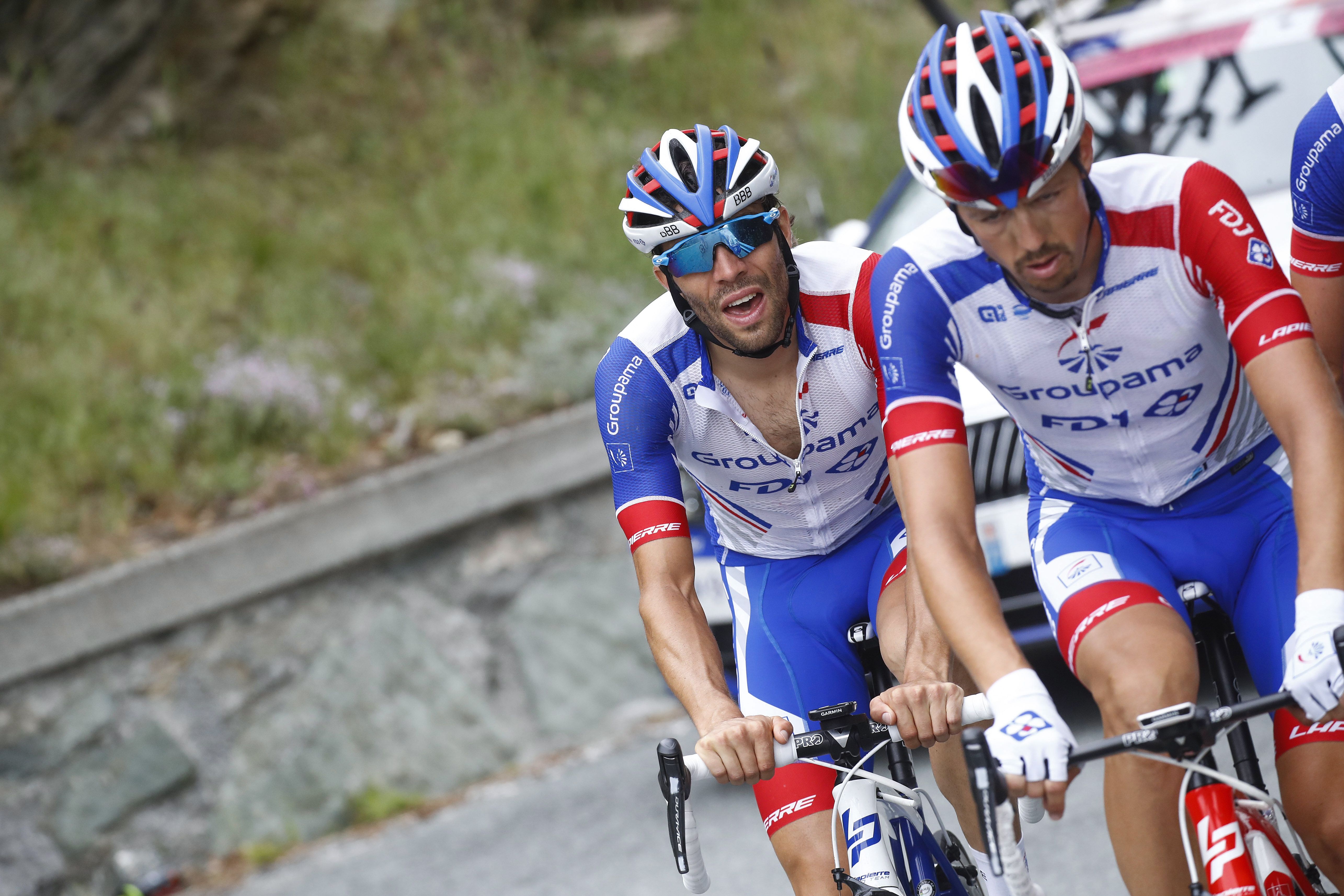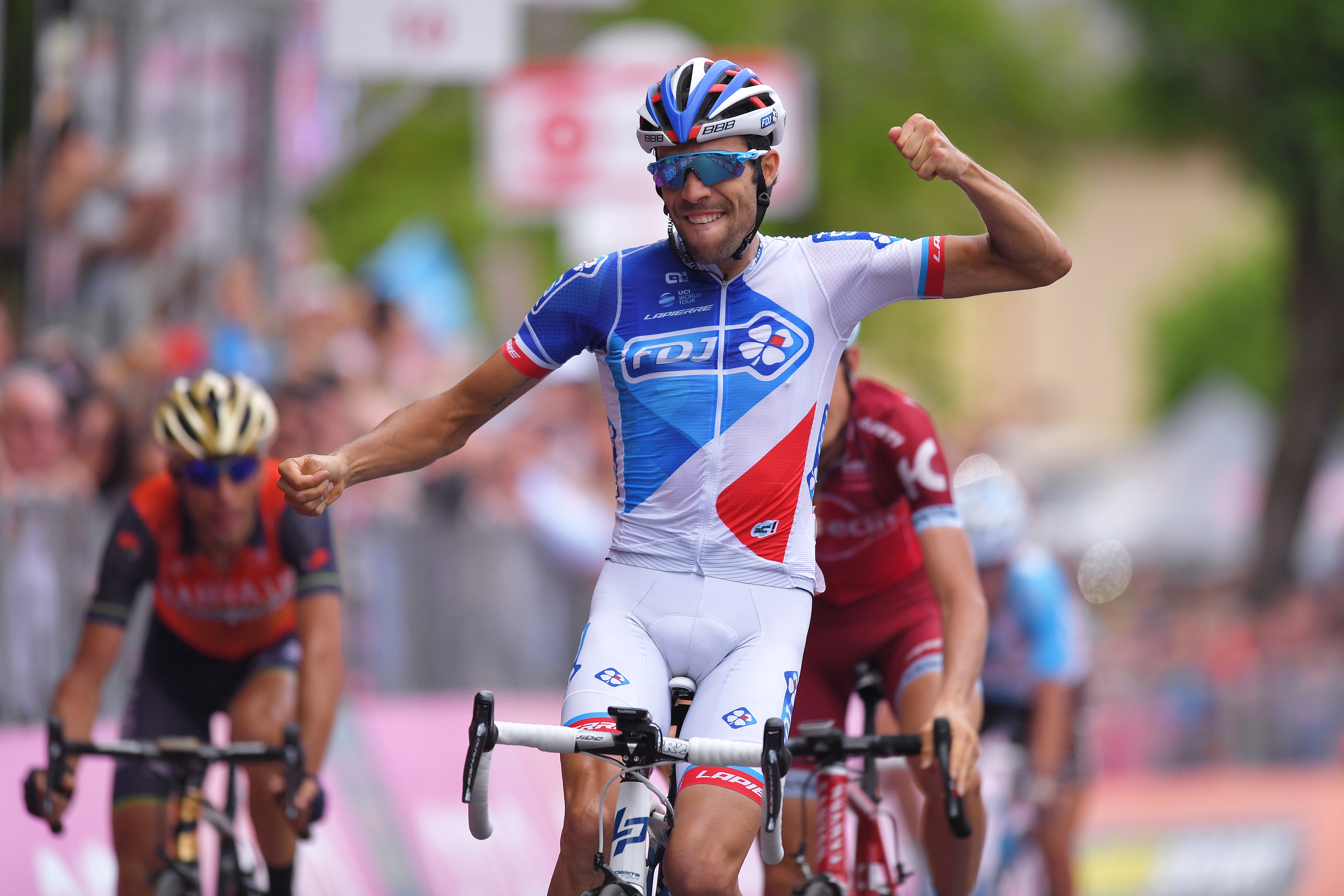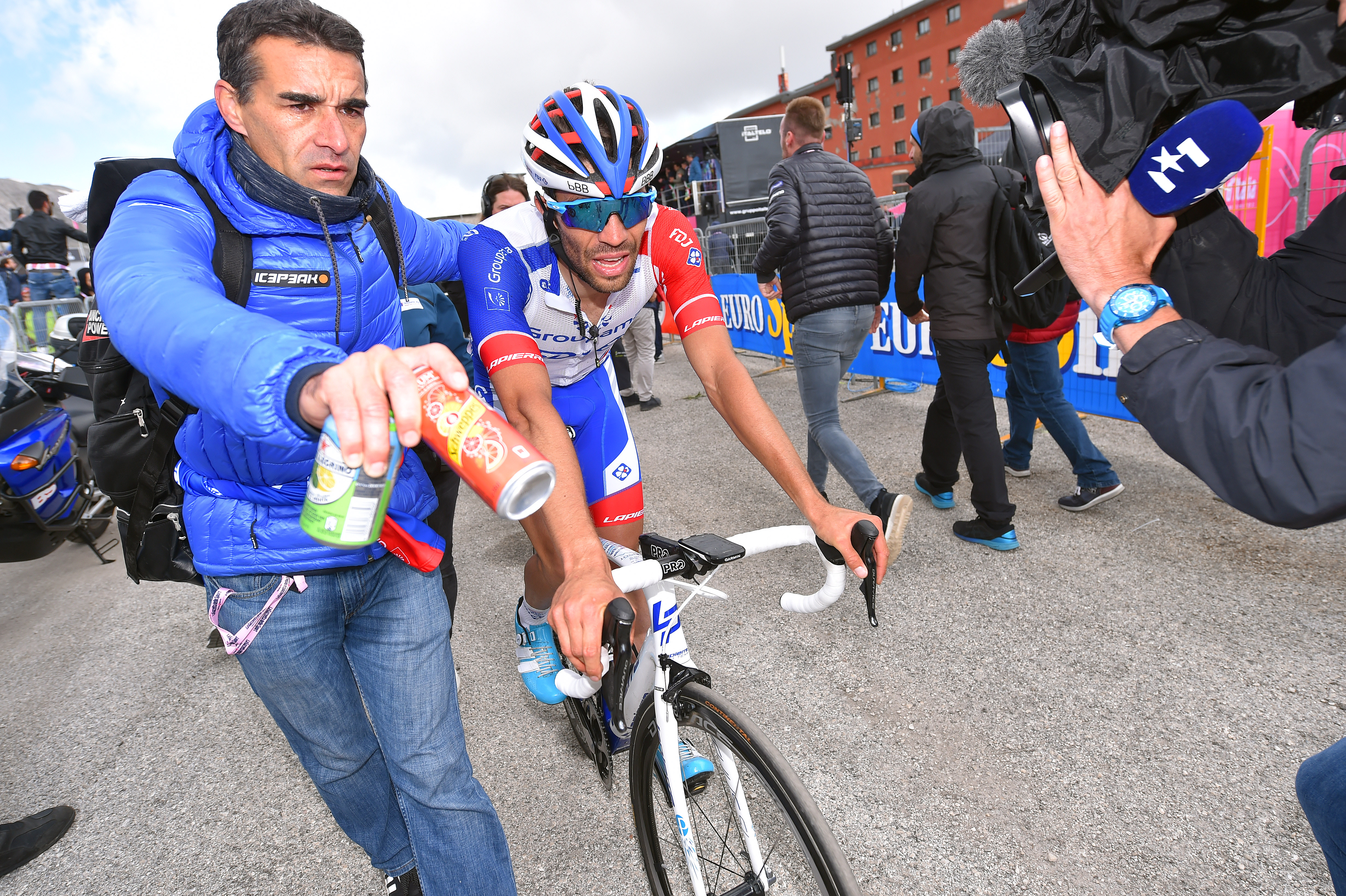
By the end of Thibaut Pinot's last Giro d'Italia, he could no longer stand on his own two feet and was coughing up blood. It was May 26, 2018, the penultimate stage of the Giro. At the finish atop Cervinia, the French climber passed out. How many seconds did he remain unconscious? No one remembers exactly, but panic rose high up there in the mountains.
His temperature reached 40°C, and he coughed a dry cough that made his eyes blink. He was eventually taken away in a Red Cross vehicle that took over an hour to make its way through traffic. His team's statement simply mentioned “dehydration” and “fever”, but he was, in fact, suffering from pneumonia.
The details of this story have long been kept confidential but, as Pinot returns for his final Giro in his last season as a professional rider, his relatives have agreed to speak about this dramatic moment.
"That day, we felt very alone," says Julien Pinot, his big brother and a coach at the Groupama-FDJ team. "There was no one around us. I drove just behind the car, calling the doctor inside every five minutes to find out how he was."
Marie-Jeanne Pinot, the rider's mother, a nurse by profession, stresses one point: "I would like people to know how much Thibaut has exhausted himself throughout his career to do his sport and to make people happy."
Thibaut Pinot, 33 years old, the most popular French rider of the 21st century and one of the most romantic in the current peloton, still lives near his parents, in the same street as them, in a huge wooden house surrounded by pine trees.
He has never left his village of Mélisey, with its 1,700 inhabitants, of which his father Régis is the mayor, in this area of the Vosges called “Les Mille Etangs” – “The Thousand Ponds” – near the famous climb of La Planche des Belles-Filles. He never wanted to move, neither for the warm climate of the Côte d'Azur, where he owns a vacation home, nor for neighbouring Switzerland, where he would have paid less tax than in France.


Before he travelled to Abruzzo for the start of the 2023 Giro, Pinot needed two full days to say goodbye to his family and his little companions – his sheep, his goats, his cows. Indeed, when he doesn't ride his bike, the French climber works on his farm, for hours.
He also bought an old barn opposite his home. This is his new project, for his life after cycling - running a guesthouse with the help of his partner Charlotte. The main room will be decorated with some antique farmers' tools, tin milk jugs and wooden rakes.
Pinot already knows his guests will ask him a lot of questions about his career. As he doesn't like to talk much about himself, he is unsure if he should rejoice at this prospect.
What might Pinot tell his guests about his three participations in the Giro, in 2017, 2018 and 2023? At first, he might say again what he has already shared in the media, namely that the Giro is his “favourite race”, over and above the Tour de France. He might also reveal that, as a teenager, he skipped school a few times to watch the last hour of the corsa rosa.
Pinot sometimes describes the Giro almost jokingly: "Good race, good landscapes, good food." More seriously, he explains: “It was the race where I experienced the most extreme emotions."
Italy has always been like a dream for the young grimpeur from the Vosges. He took his first major success in this country, at the Giro della Valle d’Aosta, which also crossed Switzerland and France, a race whose yellow leader’s jersey is sponsored by a cheese cooperative. On the last day of the 2009 edition, Pinot almost lost the lead because of his fear in the descents, but he secured his position and became the youngest winner ever of this prestigious Under-26 event.
The French team felt very proud, recalling how they had refused to race there between the end of the 90s and the beginning of the 2000s, deeming the bunch to be awash with EPO. Was Pinot's performance the beginning of a new cycling? Several young riders, disgusted by doping, liked to think so and they found some priceless optimism in this victory.
After the Giro della Valle d’Aosta, Pinot came to be given the Italianate nickname of 'Pinotto' by his teammates. At the time he dreamed of joining an Italian team, but the project never happened; the country’s teams all collapsed in the following decade and Pinot remained as loyal to Marc Madiot’s FDJ team as he did to his native Vosges. His last opportunity vanished when he turned down an offer by Team Bahrain, sponsored by a Gulf state but run at that point by a primarily Italian staff. It was also after his Valle d’Aosta success that the teenager got a tattoo on his arm: Solo la vittoria è bella – ‘Only victory is beautiful'.
What else might Thibaut Pinot tell his guests about the Giro? He will be able to look back on his only stage victory – so far – between Pordenone and Asiago, in the Alps, in 2017, when he outsprinted the favourites. Then, weakened by bronchitis, he failed in the final time trial in Milan and placed fourth overall behind Tom Dumoulin, Nairo Quintana and Vincenzo Nibali. At that point of his career, he told his friends, with a hint of regret, that the Giro d'Italia came almost too late in his life, at the age of 27, because of his long attraction to the bright lights of the Tour de France.


Pinot had, indeed, captured his first Tour stage aged 22 and was back then the youngest top-10 finisher since the Second World War, at a time when the final winners, unlike now, were not 21 or 22 years old.
His status as a French super talent would inevitably bind him to the Tour for years to come. In July, he would finish on the podium and capture the best young rider classification in 2014, he would claim iconic stage wins at l'Alpe d'Huez (2015) and the Tourmalet (2019), but he would also endure severe defeats.
"If he hadn't been French or in a French team, he would definitely have raced the Giro much earlier," says his brother and coach Julien.
Every time he has raced in Italy, Pinot has been looking for fresh air, trying to find 'real cycling', but maybe it was just a utopian idea. He certainly loves cycling alla italiana, with a very aggressive peloton, mountainous courses, and smooth roads with few obstacles - France had more than 62,000 roundabouts in 2016, as opposed to 26,000 in Italy. He likes to fight for breakaways, not for position in the peloton.
His friend Boris Zimine, now a sport director at the Swiss Tudor Development Team, sums it up like this: "Thibaut loves this thing of ‘easy cycling,’ where everyone does what they want, with no extra pressure. In a way, we could call it free cycling!"
Pinot will race in the same spirit in 2023 again. In his own words, he calls it le cyclisme plaisir – “pleasure cycling” – meaning escapes, a stage victory if possible, and no official goals for the overall classification. He dreams of a flamboyant show at the Tre Cime di Lavaredo, two days from the conclusion in Rome, and, besides, the 'Ultras Pinot', his unofficial fan club, is expected to fuel the fire in the Dolomites with a typically football style atmosphere – crazy costumes, ironic banners and illegal smoke bombs – to make the mountains even more colourful.
When he cooks breakfast for his guests with fresh eggs from his farm, Pinot might also tell of what remains his best memory of the Giro, his 80km-long chase on the road to Bardonecchia in 2018 behind Chris Froome, who had escaped on the gravel of the Colle delle Finestre.
"We were in a man-to-man fight," Pinot explained in the afterword of the book Giro. "I thought back to the teenager that I was. I even had time to ask myself: 'But what will people think in front of the TV?' I felt like we were writing a little piece of legend.”
But as always with Pinot, every high is immediately followed by a low. The day after this mythical stage, he was forced to quit the race in a Red Cross vehicle.
"Thibaut had bronchitis since the middle of the Giro, exactly like in 2017," recalls his big brother Julien. "During the night, the illness worsened. Thibaut insisted on taking the start, but it was madness! He was third overall, on the eve of the last stage, a circuit race in Rome. All the staff and all his teammates had worked for him, and he wanted to pay them back. Even though everyone told him to give up, to protect his health, he wanted to go all the way and finish the Giro."
White like a ghost, Pinot crossed the line 43 minutes after the stage winner, Mikel Nieve, while Chris Froome secured his pink leader's jersey. That was the day Pinot coughed up some blood. He would spend the night in hospital in Aosta, in a room with two elderly men.

This Giro, where he could finally have climbed onto the podium, had turned into a nightmare. This memory is even more terrible than his lows in the Tour de France – his poor performance in 2013, which had earned him harsh criticisms from the press; his sudden withdrawal in 2019, just when he seemed able to fight with the future winner, Egan Bernal; his crash on the wet road in Nice, in 2020, which injured his back and took him out of competition for almost a year.
After this 2018 Giro, Pinot began to regret a little the sentence he had stamped on his forearm. Rather than 'Only victory is beautiful', he thought the tattoo should have read: 'Only life is beautiful'.
Lorenzo Germani, the Italian U23 champion last season, remembers Thibaut Pinot's epics on the Giro. "I loved watching his attacks on TV," explains a rider who became his teammate last winter. "I would have loved him to win the Giro and I was very sad that he had to abandon. Thibaut is a sentimental rider. He opens his heart in two. The Italian tifosi like his character very much, because Thibaut is a romantic cyclist."
Germani, from Roccasecca, Lazio, was a reserve and could have ridden this Giro alongside Pinot, both as a gregario and as a chef, since the staff asks the Italian rider to carefully watch the pasta on the dinner table. He will do the Vuelta instead. "Thibaut is a very different rider," says Germani, who shares a passion for animals with him, and loves talking to him about the best ways to raise chickens.
In his future guesthouse of the Mille Etangs region, Thibaut Pinot will be able to tell all these stories to his guests if they ask him about the Giro, a race that remains both his little piece of paradise and the place of his lost illusions.
"He needs to heal the injury of his abandon in 2018," says Zimine, who raced with him in the French national junior team. "He has already written his legend on the bike, but now he wants it to be imprinted in people's heads.
"I can see he feels melancholy. Even if he dislikes the cycling milieu and prefers his animals by far, even if he likes to be alone, he is realising he will miss this life. This Giro will be very emotional for him. It's weird to say it, but I think he fears emptiness."








